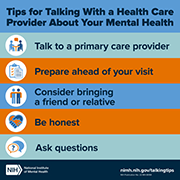
Mental health includes emotional, psychological, and social well-being. It is more than the absence of a mental illness—it’s essential to your overall health and quality of life. Self-care can play a role in maintaining your mental health and help support your treatment and recovery if you have a mental illness.
Self-care means taking the time to do things that help you live well and improve both your physical health and mental health. This can help you manage stress, lower your risk of illness, and increase your energy. Even small acts of self-care in your daily life can have a big impact.
Here are some self-care tips:
Self-care looks different for everyone, and it is important to find what you need and enjoy. It may take trial and error to discover what works best for you.
Seek professional help if you are experiencing severe or distressing symptoms that have lasted 2 weeks or more, such as:
If you have concerns about your mental health, talk to a primary care provider. They can refer you to a qualified mental health professional, such as a psychologist, psychiatrist, or clinical social worker, who can help you figure out the next steps. Find tips for talking with a health care provider about your mental health.
You can learn more about getting help on the NIMH website. You can also learn about finding support and locating mental health services in your area on the Substance Abuse and Mental Health Services Administration website.
If you or someone you know is struggling or having thoughts of suicide, call or text the 988 Suicide & Crisis Lifeline at 988 or chat at 988lifeline.org . This service is confidential, free, and available 24 hours a day, 7 days a week. In life-threatening situations, call 911.
Suicide is preventable—learn about warning signs of suicide and action steps for helping someone in emotional distress.
GREAT: Helpful Practices to Manage Stress and Anxiety: Learn about helpful practices to manage stress and anxiety. GREAT was developed by Dr. Krystal Lewis, a licensed clinical psychologist at NIMH.
Getting to Know Your Brain: Dealing with Stress: Test your knowledge about stress and the brain. Also learn how to create and use a “stress catcher” to practice strategies to deal with stress.
Guided Visualization: Dealing with Stress: Learn how the brain handles stress and practice a guided visualization activity.
Mental Health Minute: Stress and Anxiety in Adolescents: Got 60 seconds? Take a mental health minute to learn about stress and anxiety in adolescents.
![]()

Last Reviewed: February 2024
Unless otherwise specified, the information on our website and in our publications is in the public domain and may be reused or copied without permission. However, you may not reuse or copy images. Please cite the National Institute of Mental Health as the source. Read our copyright policy to learn more about our guidelines for reusing NIMH content.